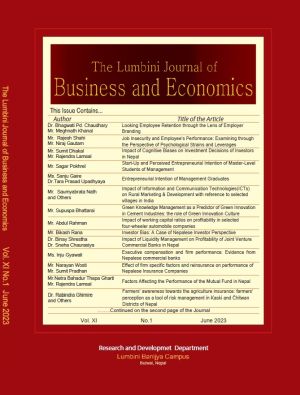Impact of Cognitive Biases on Investment Decisions of Investors in Nepal
DOI:
https://doi.org/10.3126/ljbe.v11i1.54315Keywords:
Cognitive biases, Investment, Stock market, Overconfidence, Herding, Representativeness, Anchoring, Loss-aversion, ConfirmationAbstract
This study examines the impact of cognitive biases on the investment decisions of Nepalese stock market investors using a self-administered questionnaire as the primary data collection method. By analyzing a sample of 234 respondents, the research investigates the influence of six cognitive biases: overconfidence bias, herding bias, representativeness bias, anchoring bias, loss-aversion bias, and confirmation bias. The study used both descriptive and inferential statistical tools to analyze the data. The findings reveal that a significant proportion of respondents exhibited either high or moderate levels of bias, suggesting it to be a concerning issue. The study found that representativeness bias had the strongest effect on investment decision-making, followed by herding and anchoring biases. These results suggest that cognitive biases can significantly affect the investment decisions of Nepalese investors and may have negative consequences for their investment outcomes. The study recommends that investors be aware of these biases and take measures to reduce the impact on decision-making.




